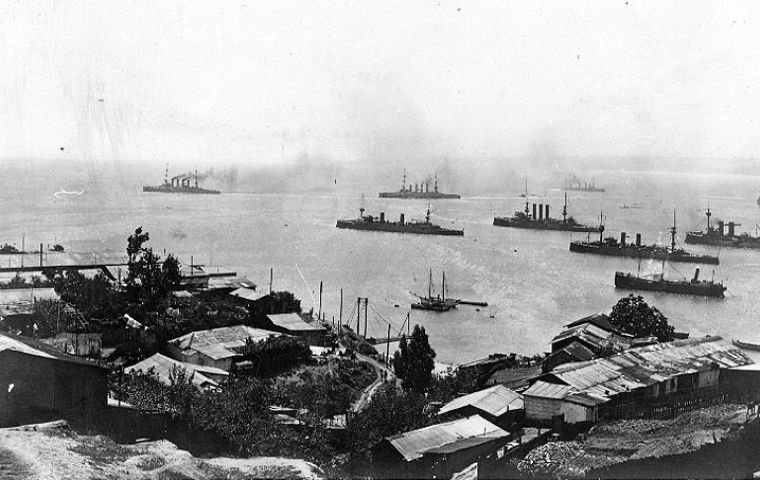MercoPress. South Atlantic News Agency
“The Battles of Coronel and Falkland Islands” restored 1927 film gala screening next October
 The ‘Battle of Coronel’ took place on 1st November 1914 and was followed by the ‘Battle of the Falkland Islands’ on 8th December. (Pic Wikipedia)
The ‘Battle of Coronel’ took place on 1st November 1914 and was followed by the ‘Battle of the Falkland Islands’ on 8th December. (Pic Wikipedia)  Directed by Walter Summers, filming took place in the open seas around Malta in 1927, with the Scilly Isles standing in for the Falklands.
Directed by Walter Summers, filming took place in the open seas around Malta in 1927, with the Scilly Isles standing in for the Falklands. British Composer award winner Simon Dobson’s latest high profile collaborative project will be heard at Queen Elizabeth Hall in London in October, with the premiere of a new restoration of one of the most significant films about the First World War.
Commissioned by the British Film Institute National Archive, Simon has written the score to the 1927 silent film, ‘The Battles of Coronel and Falkland Islands’ which will be unveiled as the BFI London Film Festival Archive gala screening in partnership with American Express®, on 16th October, followed by a nationwide release in cinemas and simultaneous release on BFI Player and later issued on BFI DVD.
Left gathering archive dust for almost 90 years, it recreates two key battles faced by the Royal Navy in the early days of the First World War, with the ‘Battle of Coronel’ taking place on 1st November 1914 followed by the ‘Battle of the Falkland Islands’ on 8th December.
The first major engagement between German and British ships at Coronel resulted in a terrible defeat for Britain with the loss of two warships, with the Royal Navy responding just over a month later in a desperate bid to save the morale of a nation at war.
Directed by Walter Summers, filming took place in the open seas around Malta in 1927, with the Scilly Isles standing in for the Falklands. Royal Navy ships were used in all the action, with no trick photography or models used to recreate the battles.
A special screening was held at Balmoral for King George V, whilst critics of the time heaped praise on the film.
Simon’s score will be performed by 24 members of the Band of Her Majesty’s Royal Marines in honor of the 24 members of the band who lost their lives with the sinking of HMS Monmouth in the first engagement.
Bryony Dixon, curator, Silent Film, BFI National Archive told 4BR: "This new restoration will showcase the hugely ambitious filmmaking task set by Walter Summers, who called on the full resources of the British Admiralty for the film.
It was hugely successful in its day and is a fitting memorial to the thousands of sailors who died on both sides."
A leading critic of the time, C. A. Lejeune stated: "The Battles of Coronel and Falkland Islands is without question the best motion picture that a British director has ever made," before comparing it in stature to the likes of Fritz Lang’s ‘Metropolis’.
Simon, whose own critically acclaimed work ‘Penlee’ was inspired by heroic loss of life at sea, told 4BR that he was honored to have worked on such an important lost classic of British film history.
"I’m thrilled to have been able to work on this extraordinary film. My music has often been described as cinematic, but this is my first film score and it’s been great working with the Band of Her Majesty’s Royal Marines.
I’ve created a musical accompaniment inspired by the popular tradition of military brass which takes the viewer on an exciting, but respectful journey through the dramatic and dark events of the two battles with a suitably engaging and occasionally dissonant score."
He added: "I’ve tried to use the full extent of the brass ensemble with a particularly strong use of percussion, bells, and struck metal to create something of the brutality of the sounds of war.
I have also used some traditional themes including navy bugle calls but incorporated them in a work which I hope supports the story in a fresh and original way.




Top Comments
Disclaimer & comment rules-

-

-

Read all commentsWould that be Coronel Blimp?
Aug 28th, 2014 - 09:36 am 0Colonel loses something in translation.
The title has been corrected. And now the honesty. The unexpected Battle of Coronel was a British defeat. Can't win them all. Undeterred, the British responded and inflicted a decisive British victory. Coronel? UK. 1,570 men killed and 2 armoured cruisers lost. Falkland Islands? Germany. 1,871 killed. 215 captured. 2 armoured cruisers sunk. 2 light cruisers sunk. 2 transports scuttled. Britain WINS. Because we do our best to do what is right!
Aug 28th, 2014 - 10:52 am 0I suppose the Argentinian Navy gave the Boche a good hiding, after all the FALKLANDS belonged to them did it not?
Aug 28th, 2014 - 01:09 pm 0Commenting for this story is now closed.
If you have a Facebook account, become a fan and comment on our Facebook Page!